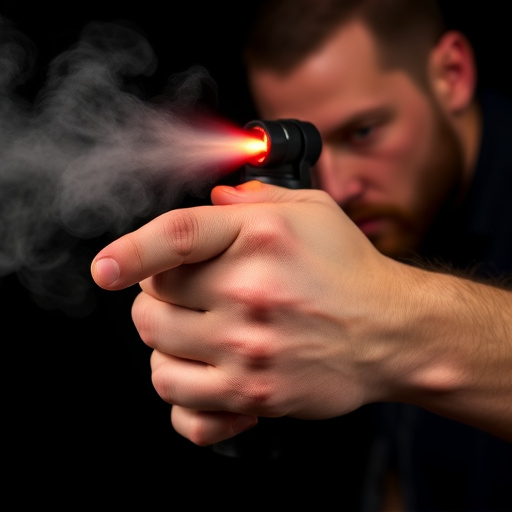TL;DR:
Exposure to police-grade pepper spray requires immediate care. This includes removing contaminated clothing, rinsing eyes, nose, and mouth with water for 15 minutes, applying a cold compress, encouraging deep breathing, and resting. Medical attention is necessary if symptoms persist or worsen, as complications can arise, especially in individuals with pre-existing conditions. Legal implications of pepper spray misuse include civil liabilities and criminal charges, emphasizing the importance of responsible handling by law enforcement agencies through proper training and de-escalation techniques.
“In today’s dynamic law enforcement landscape, understanding police-grade inflammatory pepper spray is crucial. This compound, designed for rapid response during high-risk situations, can have significant effects on those exposed. Our article delves into the composition and immediate impacts of this powerful tool, offering essential first aid guidance for swift care. Additionally, we explore prevention strategies and legal considerations surrounding its use, emphasizing responsible handling of pepper spray incidents.”
- Understanding Police-Grade Pepper Spray: Composition and Effects
- Immediate Response and First Aid for Pepper Spray Exposure
- Prevention and Legal Considerations: Handling Pepper Spray Incidents
Understanding Police-Grade Pepper Spray: Composition and Effects
Police-grade inflammatory pepper spray is a specialized compound designed for law enforcement and self-defense purposes. Its primary active ingredient is capsaicin, a natural chemical derived from chili peppers. This component is often concentrated in police spray to deliver a powerful irritant that temporarily disables individuals through ocular and respiratory distress. The exact composition can vary, but it typically includes other additives to enhance stability, penetration, and stickiness on targeted surfaces.
When exposed to pepper spray, the immediate care required focuses on alleviating its intense effects. This involves removing any contaminated clothing or eye protection promptly. Splashing water on the affected area can help dilute the capsaicin, providing some relief from burning sensations and difficulty breathing. However, it’s crucial not to rub the eyes or face, as this can spread the irritant further. Seeking medical attention is advisable if symptoms persist or severe reactions occur, ensuring prompt and effective immediate care.
Immediate Response and First Aid for Pepper Spray Exposure
In the event of exposure to pepper spray, immediate action is crucial to mitigate the effects. If someone comes into contact with pepper spray, quickly move them to an area with fresh air to prevent further inhalation. Remove any contaminated clothing or accessories, paying special attention to the eyes, nose, and mouth—areas most susceptible to irritation. Rinse these areas thoroughly with water for at least 15 minutes, ensuring no residual spray remains.
For immediate care, apply a cold compress to soothe irritated skin. Inhaling pepper spray can cause respiratory distress, so encourage deep breathing and rest. Seek medical attention if symptoms persist or worsen, as professional help may be necessary to address any potential complications, especially in individuals with pre-existing conditions.
Prevention and Legal Considerations: Handling Pepper Spray Incidents
Preventing and managing incidents involving pepper spray is a critical aspect of public safety, with legal considerations playing a pivotal role in its handling. When exposed to pepper spray, immediate care is essential to mitigate its effects. This includes removing any contaminated clothing, flushing eyes with water for at least 15 minutes, and seeking medical attention if symptoms persist or severe reactions occur.
Legal frameworks vary across jurisdictions but generally prohibit the misuse of pepper spray, which can lead to civil liabilities and criminal charges. Law enforcement agencies must ensure responsible handling, storage, and deployment of pepper spray compounds. Training officers on de-escalation techniques and proper usage is vital to prevent accidental or excessive application, thereby upholding legal standards and maintaining public trust.
Police-grade inflammatory pepper spray, with its potent composition, requires immediate care if exposure occurs. Understanding the effects and having access to proper first aid can significantly mitigate the impact. By implementing preventive measures and being aware of legal considerations, individuals and law enforcement can effectively navigate incidents involving this powerful compound, ensuring safety and swift resolution.
